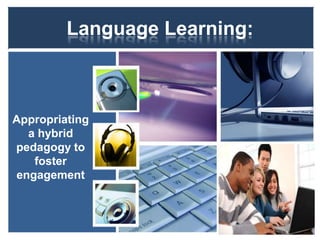
Diss pres 2
- 1. Language Learning: Appropriating a hybrid pedagogy to foster engagement
- 2. Introduction • My background - ESL • UMSL • Hybrid and Online courses – Rapidly expanding field – Pedagogically and financially • Ed Tech – Focus on the use of technology in a hybrid classroom • Language classroom – Spanish
- 3. Lenses • Sociocultural theory – Mediated mind – situated learning – how students use language in thinking activities – ZPD – problem solving under guidance • Krashen’s second language acquisition theory – i+1 – comprehensible input • Constructivist learning environment – Learners work together using a variety of tools in the pursuit of learning goals • Technological Pedagogical Content Knowledge (TPACK) – Effective technology integration • The International Society for Technology in Education (ISTE) National Educational Technology Standards (NETS) – Educator-created standards
- 4. Research Questions • For students: – How do students perceive their hybrid learning experience? • For teachers: – How do teachers take that information and make use of it when constructing a hybrid language course?
- 5. Guide for questions • Amalgam of various sites and resources • Five factors that are key to success in an hybrid course – Technology – access, use, and support – Buy in – teacher and student – Motivation – attitude and engagement – Time – teacher and student – Efficacy – following best practices?
- 6. Significance • March 8, 2013, St Louis Post-Dispatch article “Flipped classrooms: homework in class, online lectures at home” – The number of schools using the flipped approach has doubled since 2010 – Universities like the idea because this approach can ultimately cut costs – Students like it because students are the focus and they have more chances to ask questions and get feedback
- 7. Purpose of the study • The purpose of this study is twofold – To note and review student perceptions of content delivery, knowledge expression activities, and assessment of hybrid language instruction – To monitor teacher development and understanding of best hybrid pedagogy
- 8. Methods • Basic qualitative study • Phenomenological case study – Lived experience (Van Manen, 1990) – Primary method of data collection: interviews (Merriam, 2009) and observation – Researcher explores own experience (Merrriam, 2009) • Bracketed (unbiased) (Husserl, 1970) and “unbracketed” (biased) – Better overall understanding of another’s experience (Creswell, 2007) – Horizontalization (Moustakas, 1994) – data analysis – clusters of meaning – equal weight – Textural Descriptions – using participant voices (Moustakas, 1994) – Structural descriptions - contextualization (Moustakas, 1994) – Composite – combination of textural and structural
- 9. Methods • Phenomenological case study – “over time, through detailed, in-depth data collection involving multiple sources of information” (Creswell, 2007) • Observations, interviews, audiovisuals, written materials, reports, written work, online work, etc. – Bounded system – a particular hybrid course – Unit of analysis – learners’ experiences in that particular hybrid course – Instrumental - “provide insight” “facilitates our understanding” (Stake, 2005)
- 10. Methods • Grounded theory – “particularly useful for addressing questions about process, that is, how something changes over time” (Merriam, 2009) • Data – interviews, observations, documentary materials (Merriam, 2009) • Theoretical sampling - analysis of data being collected in order to decide what data to collect next (Glaser & Strauss, 1967) • Constant Comparison – data is grouped and analyzed looking for emerging patterns (Corbin and Strauss, 1990)
- 11. Timeline Phenomenological case study • Mid-July – pre-program interview with teacher – life history • Pre-program student survey – life history - Qualtrics embed • Classroom observation – 8 total classes (3 hours – T/Th) – observe 4 – first two Tuesdays and last two Thursdays • Mid-program student survey - contemporary experience - Qualtrics • Mid-program teacher interview – present experience • Think alouds – purposeful sampling – maximum variation (Patton, 1989) - students chosen with teacher input to represent a spectrum • Post-program student survey – reflection on meaning - Qualtrics • Post-program teacher interview – reflection on meaning (Seidman, 2013)
- 12. Timeline Grounded theory research • Collect and analyze data in an ongoing process (Strauss & Corbin, 1990) – starting in July • Data is given conceptual labels and categories begin to form (Strauss & Corbin, 1990) which will help inform future questions • “After developing a tentative category, we return to the field setting to gain specific data to illuminate the category” (Charmaz, 2011, p.167) - • A variety of teachers will be interview in the language department to “identify as much variation in types as possible” to find representatives of concepts (Strauss & Corbin, 1990) • Patterns and variations are collected in theoretical memos (Strauss & Corbin, 1990) • Language teachers will be identified and interviewed at the beginning of the Fall semester